The International Monetary Fund (IMF), an international organization heavily funded by the United States, on Friday reached an agreement with Pakistan to provide $3 billion in short-term financial aid.
The Pakistani bond market perked up at news that a potential debt default crisis has been delayed, but not enough to suggest that investors see a bright future for Pakistan’s finances.
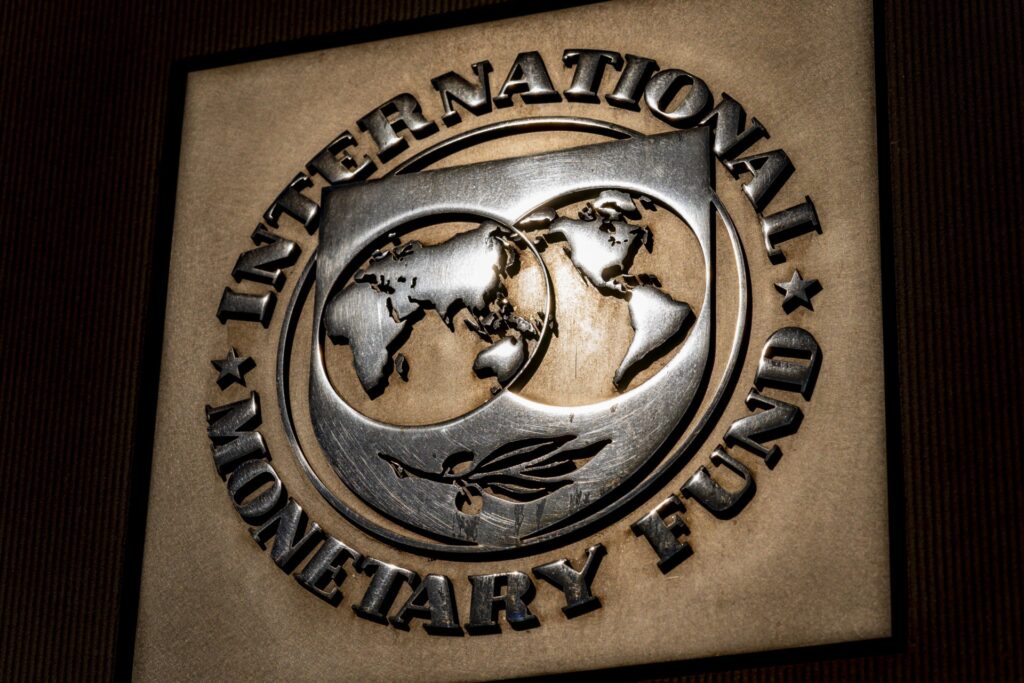
The logo of the International Monetary Fund is visible on its building, April 5, 2021, in Washington. (AP Photo/Andrew Harnik)
The IMF signed a long-term bailout deal with Pakistan in 2019 that expires on June 30, with about $2.5 billion in funds yet to be released. The last-minute agreement announced on Friday, which must still be ratified by the IMF Board of Governors in July before it can take effect, would extend the bailout by nine months and add half a billion dollars in additional financing.
“The IMF funding will also unlock other bilateral and multilateral external financing and debt rollovers, particularly from friendly countries like Saudi Arabia and the UAE, which have already pledged around $3 billion,” Reuters reported Friday.
Negotiations over the new bailout package stretch back for months. The IMF was reluctant to authorize more funding because the Pakistani government, under Prime Minister Shehbaz Sharif, was reluctant to implement spending cuts and other “austerity” measures required for more financial support.
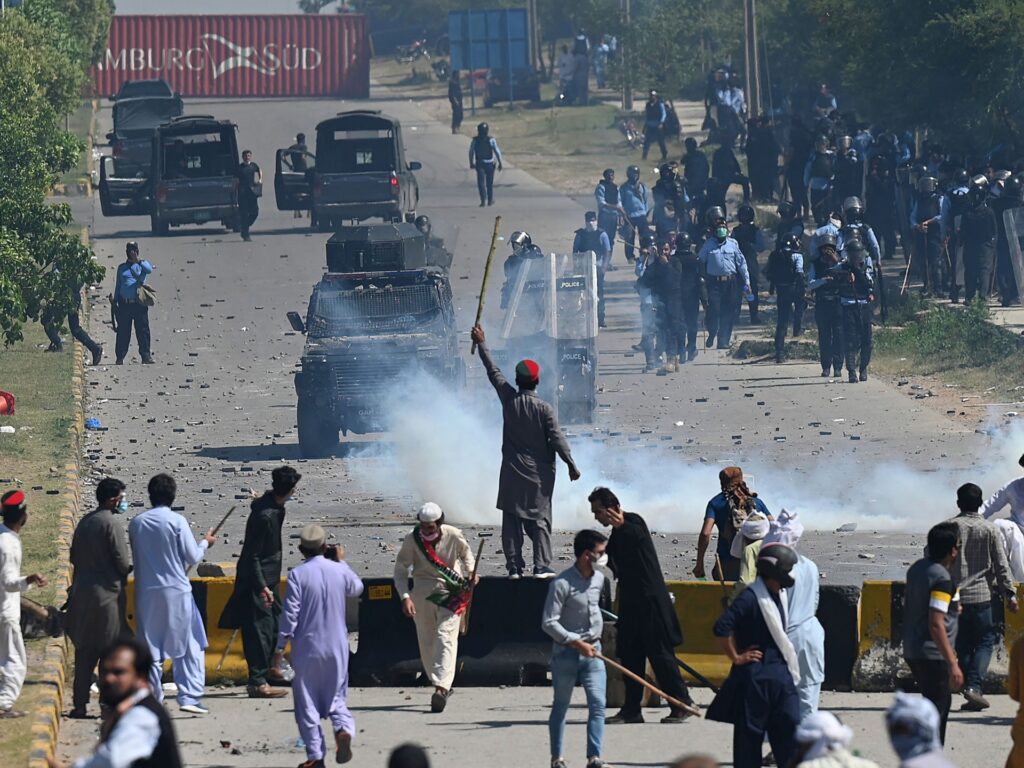
Police (back) use teargas to disperse Pakistan Tehreek-e-Insaf (PTI) party activists and supporters (foreground) of former Pakistan’s Prime Minister Imran Khan during a protest against the arrest of their leader, in Islamabad on May 10, 2023. (AAMIR QURESHI/AFP via Getty Images)
In particular, Sharif antagonized the IMF in April by offering gasoline subsidies to Pakistani motorists in a rather blatant effort to prop up his flagging poll numbers. Sharif had promised earlier in bailout negotiations that he would not spend scarce budget money on such a scheme.
IMF officials also criticized Pakistan for creating subsidy programs that tended to benefit the wealthy and well-connected rather than the poor, for devising unsustainable budgets that bore only a passing resemblance to the government’s income stream, and for becoming politically unstable as ousted prime minister Imran Khan waged a populist campaign to return to power, while Sharif’s government resorted to increasingly drastic measures to stop him.
The IMF clearly signaled its displeasure with the tactics Sharif used against Khan last month, prompting an angry response from government officials who insisted their refusal to hold constitutionally mandated provincial elections was “in line with the law.”
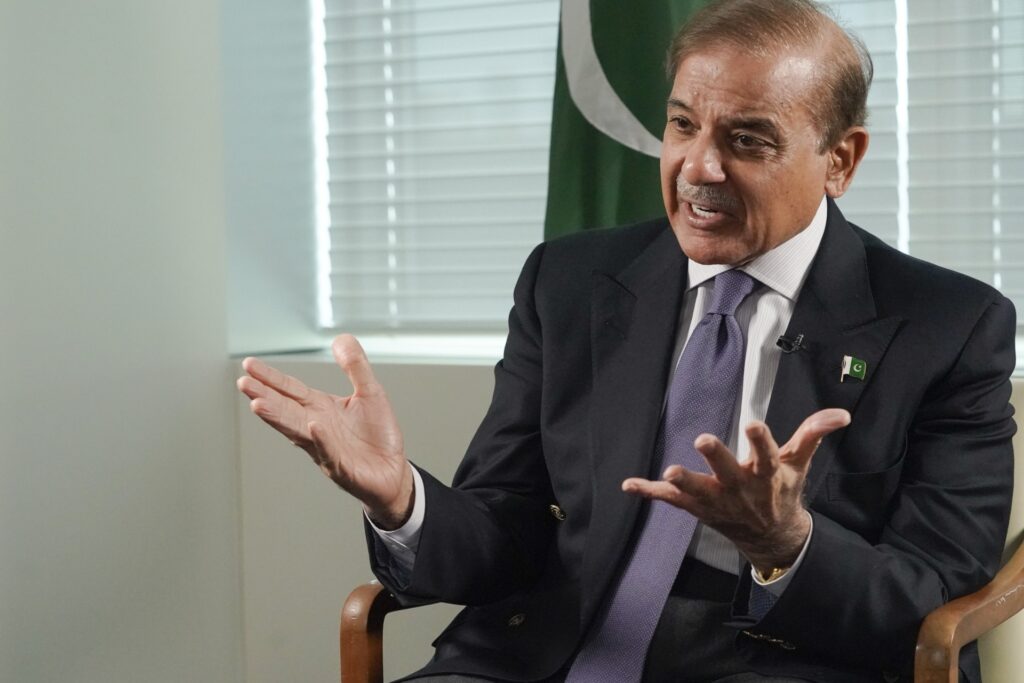
Prime Minister of Pakistan Shehbaz Sharif speaks during an interview with The Associated Press, Thursday, Sept. 22, 2022 at United Nations headquarters. (AP Photo/Mary Altaffer)
The IMF flatly rejected Pakistan’s budget proposal in early June, even as the clock began ticking on the final month of the old bailout agreement. Inflation hit 38 percent, both rich and poor Pakistanis began fleeing the country — a much more perilous undertaking for the poor — and no one could say exactly what would happen if June 30 passed without a deal. It seemed unthinkable that Sharif would agree to the reforms demanded by IMF negotiators, but if he remained intransigent, hyperinflation and drastic shortages of imported food and medicine were likely.
According to the IMF mission chief for Pakistan, Nathan Porter, there was a breakthrough in seemingly deadlocked bailout negotiations this week, with Pakistani officials taking “decisive measures to bring policies more in line with the economic reform program supported by the International Monetary Fund.”
One of those measures was Pakistan’s central bank raising its main interest rate to 22 percent, the highest it has ever been. Islamabad also agreed to reduce energy subsidies, remove restrictions on imports, deregulate currency trading, and raise taxes.
“The economy has faced several external shocks such as the catastrophic floods in 2022 that impacted the lives of millions of Pakistanis and an international commodity price spike in the wake of Russia’s war in Ukraine. As a result of these shocks as well as some policy missteps… economic growth has stalled,” Porter said.
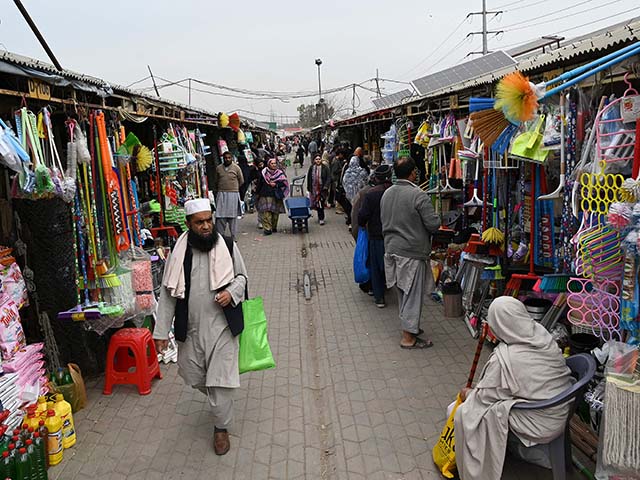
Residents walk through a weekly market in Islamabad on February 3, 2023. (AAMIR QURESHI/AFP via Getty Images)
Sharif thanked the IMF on Friday for offering some much-needed economic stability and shoring up his country’s foreign exchange reserves. He also thanked China, Saudi Arabia, and the United Arab Emirates (UAE) for offering financial assistance – and he blasted Imran Khan for allegedly causing an economic downturn with his destabilizing political antics.
Sharif said that if the agreement he worked out with the IMF is fully implemented, “we will achieve the target of a stable economy and become a prosperous country.”
Many analysts doubted the IMF money would do more than delay Pakistan’s rolling economic crisis. The agreement reached on Friday represents Pakistan’s 23rd IMF program since it became an independent nation in 1947.
“Over the last three decades, IMF assistance has not been able to bring about tangible reforms. IMF programmes have just been more of a band-aid,” former World Bank adviser Abid Hasan told the Financial Times on Friday.
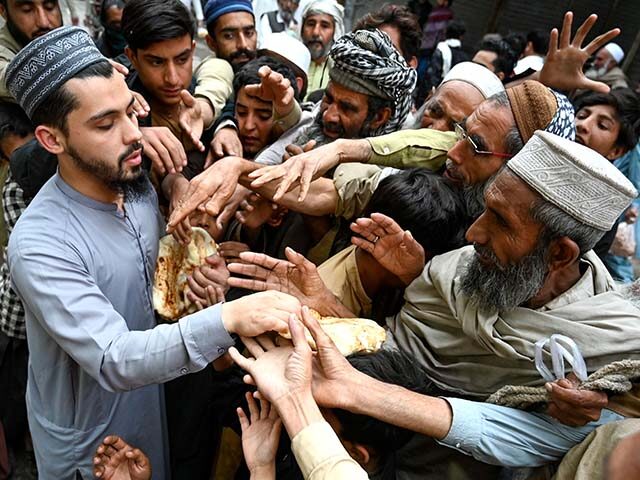
COMMENTS
Please let us know if you're having issues with commenting.